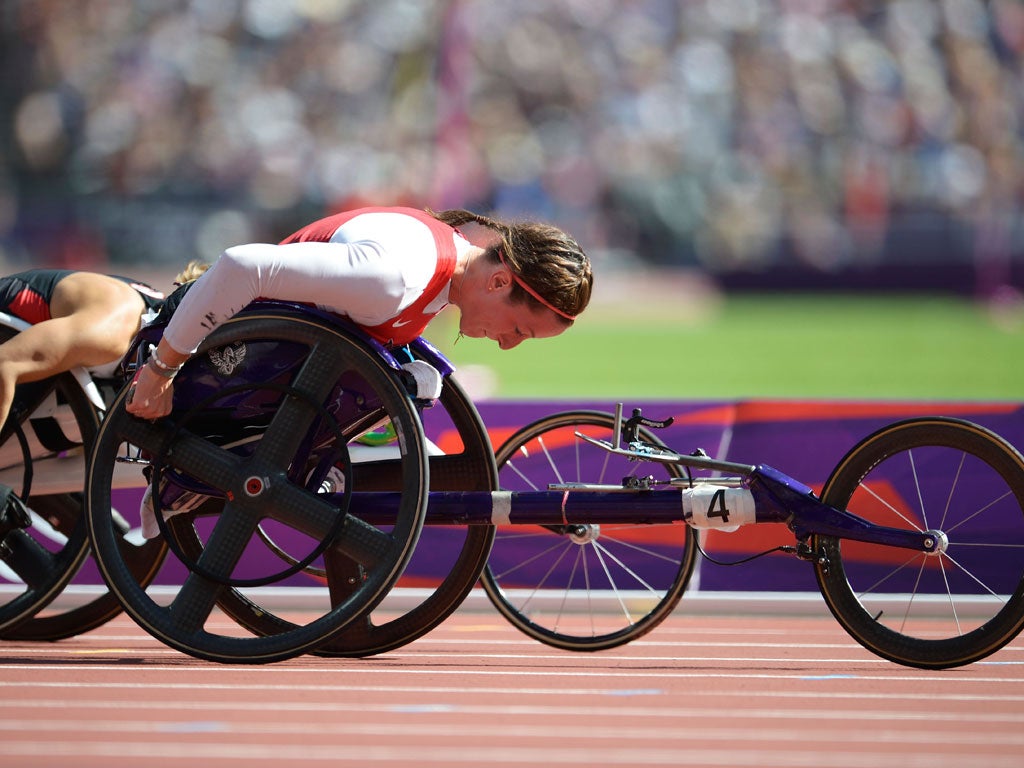Paralympians face battle for spotlight after flame dies out
London may be an impossible act to follow but can the acclaim for disabled sport be sustained?

Your support helps us to tell the story
From reproductive rights to climate change to Big Tech, The Independent is on the ground when the story is developing. Whether it's investigating the financials of Elon Musk's pro-Trump PAC or producing our latest documentary, 'The A Word', which shines a light on the American women fighting for reproductive rights, we know how important it is to parse out the facts from the messaging.
At such a critical moment in US history, we need reporters on the ground. Your donation allows us to keep sending journalists to speak to both sides of the story.
The Independent is trusted by Americans across the entire political spectrum. And unlike many other quality news outlets, we choose not to lock Americans out of our reporting and analysis with paywalls. We believe quality journalism should be available to everyone, paid for by those who can afford it.
Your support makes all the difference.As the Paralympic Games approach their golden finale today, one question burns with the intensity of the flame that has lit up our lives these past 12 days. How long will our new-found passion for sport for the less able linger? Or is it destined to fade like the flame itself tonight?
Paralympians have fought long and hard for their showpiece to be recognised on merit as a sports event and not as a worthy adjunct to its able-bodied brother.
London 2012 provided a wonderful platform on which to demonstrate to the world that the Paralympics really have come home. But are they here to stay? And do we finally accept that it is truly sport and not just a novelty, a fascinating freak show?
Anyone who has witnessed the Klitschko brothers fight in Germany will tell you that they are not attending a boxing contest, simply an event. Ecstatically cheering audiences, often up to 50,000, who pack the stadiums to capacity have little interest in whom Vitali or Wladimir are fighting. They are simply there for the spectacle, a gala night out. The idolised heavyweight champions could be playing pat-a-cake with one of the seven dwarfs for all they care.
It is the same for the Wimbledon men's singles final. Wasn't it Jimmy Connors who once said that the Centre Court customers would pay to watch it contested between two orang-utans?
My hope is that the crowds that flocked to the Olympic Park or packed the ExCeL Arena yesterday to watch Brits contest such arcane pursuits as boccia or wheelchair fencing weren't doing so out of similarly instinctive voyeurism or curiosity, or because being there suddenly became the vogue on the coat-tails of an arguably unmatchable Olympics. I hope that they turned out in droves for the sport and not just for the theatre.
This was indeed a unique celebration of genuine athletic achievement, albeit founded on stories that persistently tugged at the heartstrings, brought tears to eyes and lumps in throats, when actually all the competitors wanted were encouraging cheers from those who watched them.
And those came in abundance as the Paralympics unfurled to reveal performances and personalities the equal of the Games that had preceded them, hopefully to remain etched indelibly in the memory. Consequently the unabashed fervour which swamped those earlier 17 days of glory during the Olympics was joyously revisited.
So what next for those who have given the Paralympics the parity they craved? The real litmus test for the future of sport for the disabled is not 2012 but whether such unprecedented acclaim can be sustained.
Will the media coverage and spectator appeal be anything like as huge for next year's World Championships in Lyon (where taekwondo is pressing for inclusion) and then the 2014 Commonwealth Games in Glasgow? These will have just five Para-sports – swimming, athletics, lawn bowls, powerlifting and cycling – compared to the 22 here. But they will be integrated with the able-bodied events, as in the past three Commonwealth Games.
Track cycling will make its Commonwealth debut in Glasgow as one of the optional sports, providing medal opportunities for vision-impaired athletes who will compete alongside able-bodied team members in the new Sir Chris Hoy Velodrome. In all, 22 fully integrated medal events will be offered in Glasgow, plus an equal number of medal opportunities for both male and female Para-sport athletes.
Glasgow 2014's chief executive, David Grevemberg, told The Independent on Sunday: "I am thrilled that following the finalisation of our sport programme we are able to offer more events and medal opportunities for Para-sport athletes than any other Commonwealth Games in history.
"Our commitment to Para-sport underlines its growth and popularity at all levels. After the huge success of London 2012, it will ensure that Commonwealth Para-sport athletes can continue to perform on the big stage in front of thousands of spectators."
The Paralympics in Rio follow two years later. London has set the bar and, as with the Olympics, may well prove an impossibly hard act to follow. In some ways it does seem a shame that the world's two biggest sporting events have to be treated separately. I am not suggesting that, as with the Commonwealth Games, the Paras should be interwoven with the Olympics. Clearly that is not practical.
But did they really have to extinguish the Olympic flame on 12 August, only for it to be re-lit 17 days later? At least keeping the flame alive would have made it seem more like a Games of two halves rather than two totally separate entities.
Because while what we have seen these past two weeks may have been extraordinarily, excitingly different, there has been one unifying common denominator: it is called sport.
Join our commenting forum
Join thought-provoking conversations, follow other Independent readers and see their replies
Comments